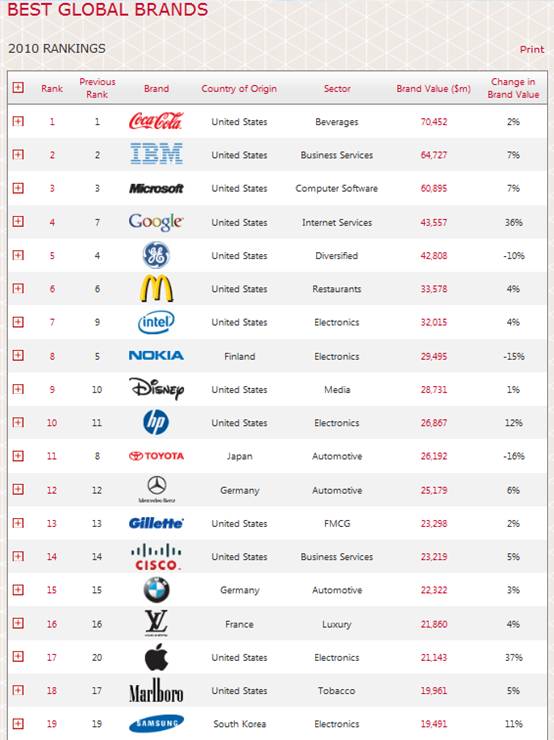Global Brands
Multinational organisations have a choice when it comes to marketing their products in the global market place. They can choose to focus on each individual market using an adjusted strategy and selling under different brand names or they can use the same brand name and marketing approach in every market.
Local branding has the advantage of identifying local tastes, fashions, beliefs and conditions and allows customers to believe that the product is locally manufactured or produced.
Global brands are brands that are recognised throughout much of the world and firms employing this unified approach use a similar marketing strategy to support the brand and its development everywhere. This ensures consistency in presenting the brand's values in all of its markets. The advantage of a global brand is that the firm can gain from marketing economies of scale. For example, the same advertising strategy can be employed worldwide using the same celebrities, words and images. With the massive global growth and development of the internet, presenting a unified image through a standardised brand has become increasingly popular.
Successful global brands focus on presenting a unique, meaningful, and enduring image to its target market, which can be adapted to local demands. Maintaining a consistent global approach allows consumers to find and understand the brand wherever they are and creates global brand loyalty. For example, McDonalds stores worldwide offer very similar menus (although there may be some adaption to local tastes) in restaurants with clearly recognisable design features.
Perhaps it is not surprising that the brands with the highest asset value, and those which have had the largest increases in value, operate as single brands worldwide. Obvious examples of these can be found from the top brands in both the Interbrand Top Global brands and the BrandZ rankings. Brands such as Coca-Cola, Microsoft, IBM and McDonalds use the same image, logos and visual wherever they are marketed.

Well known brands in one national market may not be so in another, so the firm may need to raise awareness in some markets of their brand, whilst reinforcing brand values in others. Tesco found that it could not rely on brand recognition that it enjoyed in the UK when it expanded in Eastern Europe and as a result had to invest heavily in raising brand awareness in these new markets. They have taken a slightly different approach in their expansion into China accepting the need to enter into a number of joint ventures to improve brand recognition.
"Think global, act local" is the mantra for international companies of all shapes and sizes that have a global reach, but an awareness of local needs and aspirations.
Glocal branding is where a business acts like an international brand while behaving like a local one. To 'glocalise' a brand is to think globally and act locally. HSBC have built a long-standing advertising campaign based on this idea of being a local global bank, which accepts and promotes difference.
Market segmentation by brand recognises that consumers have differing lifestyles, attitudes about a promised benefit varies by target and geography. A brand can maximize its opportunity in virtually every locality by tailoring its message to the needs of local audiences.
According to a Malaysian Star report:

Worldwide consumer research found that while people appreciated the value of international organisations and services, they questioned the prevailing 'One size fits all' global model...
Consumers wanted to be treated as individuals and to feel that the companies cared about them, recognised their needs and understood what makes their community unique.
Synovate, the market research arm of Aegis Group plc, provides marketing solutions and employs over 6,000 staff across 62 countries. It makes a point of pointing out that it has no head office and that it offers local solutions backed by a global infrastructure
There may, however, be some problems with language and translation when a firm tries to turn its national brand into an international brand.
There are several potential problems a company's brand name and/or marketing slogans, could face in other countries and languages. The brand name:
- has a negative, unpleasant, offensive, suggestive, or embarrassing meaning in the target country
- has a spelling or pronunciation with negative connotations in the target country
- is already in use in the target country
- is difficult or impossible to pronounce in the target language
- has associated images or colours with inappropriate meanings in the target country